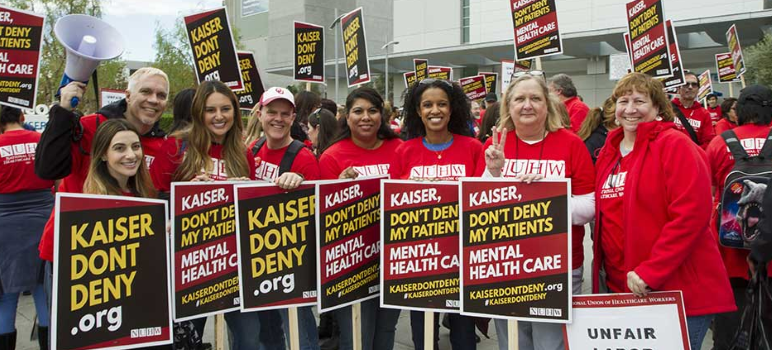Beginning Monday, Aug. 15, Kaiser Permanente mental health clinicians represented by the National Union of Healthcare Workers will stage strikes at selected Kaiser facilities across Northern California.
The union said nearly 2,000 psychologists, therapists, social workers, psychiatric nurses and addiction medicine specialists — along with other medical professionals — will stage pickets outside 27 different facilities from Sacramento to Fresno in a rotating two-week schedule.
The strike begins Monday at Kaiser facilities in Fresno, Sacramento, San Francisco and in San Jose at Kaiser’s San Jose Medical Center on Hospital Parkway.
The Kaiser facility at the Santa Clara Medical Office Building on Lawrence Expressway also is one of the strike targets.
Among the reasons union representatives outlined: high clinician workloads and patients waiting weeks or even months for mental health care. Even as demand for care has surged, frustrated therapists are abandoning the health giant, the union said.
Kaiser is not the only provider facing a shortage of mental health practitioners. Complaints of shortages also have been raised by counties, school districts and non-profit organizations around the state. The union claims that Kaiser providers are being recruited to work at telehealth start-ups.
The union says the rate at which mental health clinicians are leaving Kaiser nearly doubled in the past year, with 668 clinicians leaving between June 2021 and May 2022, compared to 335 clinicians the previous year. In a union survey of 200 of those departing clinicians, 85 percent said they were leaving because their workload was unsustainable or they felt they did not have enough time to complete the work, and 76 percent said they were unable to “treat patients in line with standards of care and medical necessity.”
Kaiser Permanente and the National Union of Healthcare Workers have been in active collective bargaining negotiations in Northern California and Hawaii since mid-2021. “We are committed to bargaining in good faith to reach fair and equitable agreements that are good for our mental health professionals and our patients.” Kaiser said in a statement.
Deb Catsavas, senior vice president of human resources at Kaiser Permanente Northern California, released this statement:
“The primary role — and essential need — for our therapists is to provide mental health care and treat our patients. The remaining issue being negotiated with NUHW is the amount of time therapists spend on administrative tasks such as documentation, planning, and other office activities rather than directly treating patients. In recognition of our therapists’ concerns and priorities, we have proposed an increase in the scheduled time allocated to administrative tasks, but the union is demanding still more administrative time.
“As an example,” she continued, “under the current collective bargaining agreement, a 40-hour-per-week therapist whose only job is to provide patient therapy would spend 34 hours seeing patients, with 6 hours reserved for administrative tasks. We have proposed increasing the time for administrative tasks in this example to 7.2 hours, leaving 32.8 hours to see patients. The union is demanding 9 hours for administrative work, which would leave only 31 hours to see patients.”
“The union’s demand flies in the face of a 30% increase in demand for mental health care and NUHW’s own commitments to help improve access to mental health care,” Catsavas said. “Our patients cannot afford a proposal that significantly reduces the time available to care for them and their mental health needs.”
“For the entirety of its 12 years of existence, NUHW has used the threat of strikes as a bargaining tactic in every contract negotiation,” the human resources vice president said. “This will be the second time in a year the union has called on mental health providers to walk away from our patients.”
She added: “We have the deepest appreciation and gratitude for our mental health professionals and the extraordinary care they provide to our members. We recently reached an agreement with the same union in Southern California for 1,900 mental health professionals. Despite the union’s harmful tactics, we remain committed to bargaining in good faith to reach a fair and equitable agreement that is good for our therapists and our patients.”

